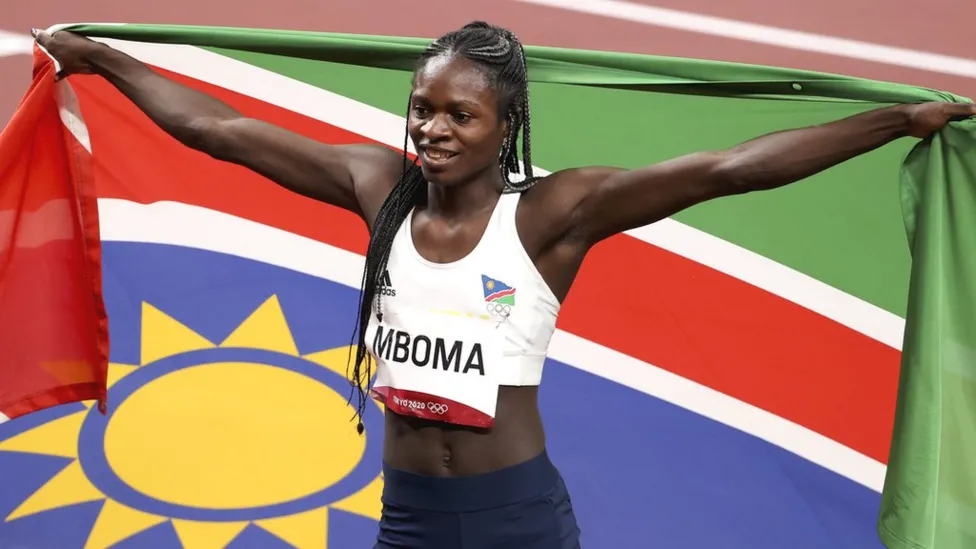Olympic 200m silver medallist Christine Mboma says her enforced hiatus from athletics took a toll on her mental health, but continuing to train stopped her losing hope.
The 20-year-old has not raced competitively for 20 months after a change to the rules for athletes classed as having differences in sexual development (DSD).
The Namibian has been taking medication to lower her naturally-occurring testosterone levels and will return in the 100m at the Kip Keino Classic in Kenya on Saturday.
“It’s not easy mentally – I’m not okay even now,” Mboma told Sport Africa.
“I am a strong person and any stuff that happened to me I tried to forget. But it’s not easy.
“Training made me not lose hope, and then also it helped me with managing the stuff that I was going through.”
DSD is a group of rare conditions, external whereby a person’s hormones, genes and/or reproductive organs may be a mix of male and female characteristics. Some of those affected prefer the term “intersex”.
World Athletics felt DSD athletes would have an unfair advantage in female races, and in 2018 the governing body put rules in place to require them to lower testosterone levels in order to compete in events ranging from 400m up to the mile.
Unable to run her favoured 400m, Mboma ran over 200m at the delayed Tokyo 2020 Olympics and became the first Namibian woman to win a medal at the Games.
She also became world under-20 champion over 200m in 2021.
Then, in 2023, World Athletics further revised its regulations, barring DSD athletes from competing in any track events unless they reduced their high testosterone levels.
DSD athletes are now required to reduce their blood testosterone level to below 2.5 nanomoles per litre (down from the previous figure of 5nmol/L), and remain under that threshold, in order to compete internationally in the female category in any track and field event.
That locked Mboma out of all competition until she complied with the new regulations – including what would have been her first senior World Championships in Budapest, Hungary, last August.
It left the Namibian track star’s career in limbo and former rugby player turned athletics coach Henk Botha, who works with Mboma, was “shocked” by the rule changes.
“It was a difficult time for myself and Christine, just coping with whether she can run again,” Botha told Sport Africa.
“But I must give so much credit to her and how she handled it. She’s strong [to] even have a smile on her face here and be excited to run.”
This weekend in Nairobi Mboma will return to competition for the first time since winning bronze in the 200m at the 2022 Commonwealth Games in Birmingham.
“It has been a long time since I have run. I’m looking forward to run again,” she said.
“I am happy to be back to the place I love, which is running.”
Mboma targeting Paris 2024
Christine Mboma with her Olympic silver medal which she won in the 200m at the Tokyo 2020 Games
Mboma followed up her Olympic silver medal in Japan by winning the World Under-20 200m title in 2021
Mboma was not comfortable speaking about her testosterone-lowering medication and any side-effects it might have had, saying only that she feels the same as she did before taking the drugs.
Two-time Olympic 800m champion Caster Semenya, who is also classified as a DSD athlete, has previously discussed the negative impact medication to lower testosterone had on her.
The South African, who is fighting DSD rules through the courts, always maintained that she would not advise other athletes to take such medication.
But Mboma’s coach says the experience depends on individuals.
“We had to do trial and error to see what works for her body and what’s going to be the best,” Botha explained.
“Luckily we’ve got a good team around us. We didn’t see any side effects.
“Even though Christine has gone through this process and come out on the other side, this is individual and every single athlete is different.”
The team continue to monitor any long-term effect the medication might have, but they hope this weekend will fire the starting gun on a successful year.
Mboma is aiming to do a sprint double, over 100m and 200m, at the Paris 2024 Olympics.
“My goal is just to qualify for the Olympics and the rest will follow,” she added. “I feel good to be back again on track.”
‘Time for Africa’
Letsile Tebogo celebrates at the World Athletics Championships in 2023
Botswana’s Letsile Tebogo will also be in action at the Kip Keino Classic
The last time Mboma competed in the Kenyan capital, in 2022, she suffered a thigh injury which she described as “awful” and still gives her flashbacks.
The Namibian is among a number of top African sprinters who will be in action at the Kip Keino Classic, which is classified as a World Athletics Continental Tour gold meet.
Ferdinand Omanyala, the men’s African record holder over 100m, will be running on home soil alongside Botswana’s 100m world silver medallist Letsile Tebogo.
The pair are currently ranked among the best sprinters in the world this year and Tebogo believes the continent is ready to make its mark on the global stage over shorter distances.
“I strongly believe this is an African year, because when you look at Ferdy (Omanyala), Akani [Simbine] and me, we are there to take over,” the 20-year-old said.
“For me this season is all about challenging the body, because it’s our first Olympics. We are playing it safe so there’s not much pressure on ourselves.”
Tebogo will run in the 200m – a distance he admits is his favourite compared to the highly tactical 100m, while Omanyala will be competing in the 100m.
Other top athletes set to feature at the event include Kenya’s 800m world champion Mary Moraa, and Poland’s reigning Olympic hammer throw champions Anita Wlodarczyk and Wojciech Nowicki.
